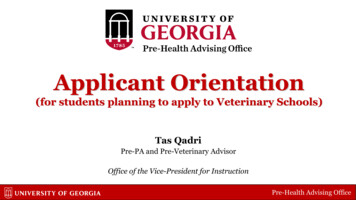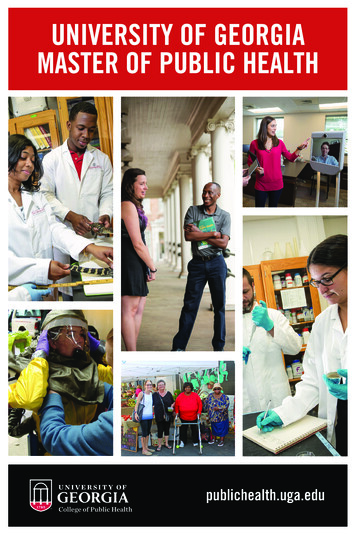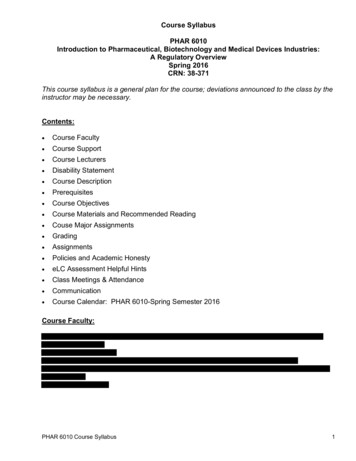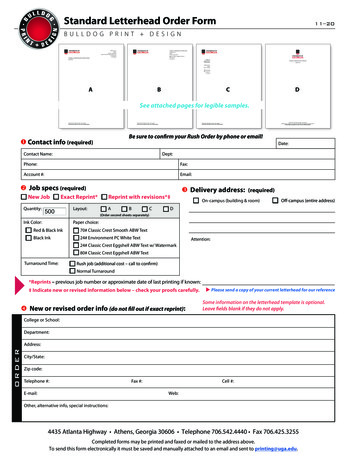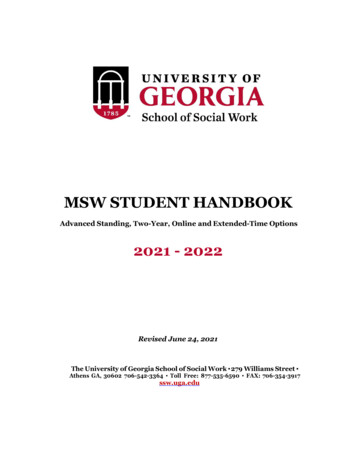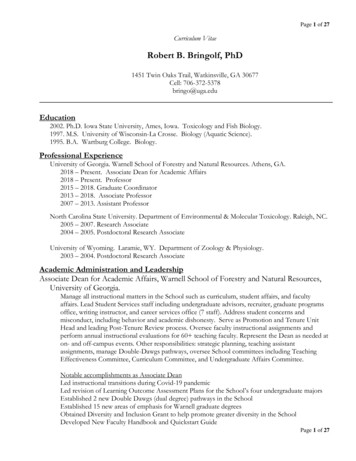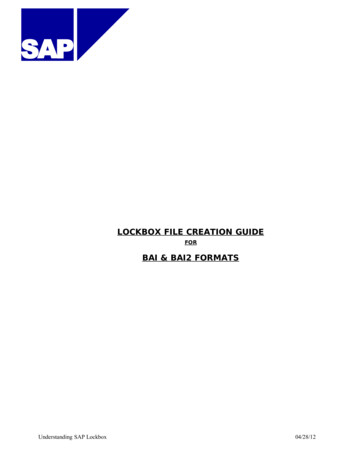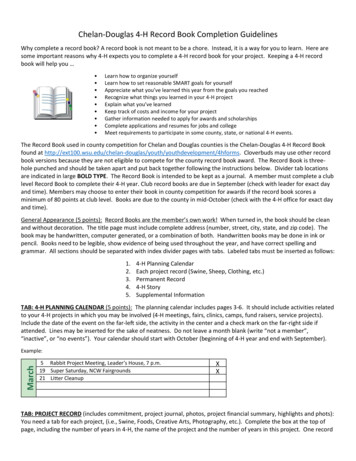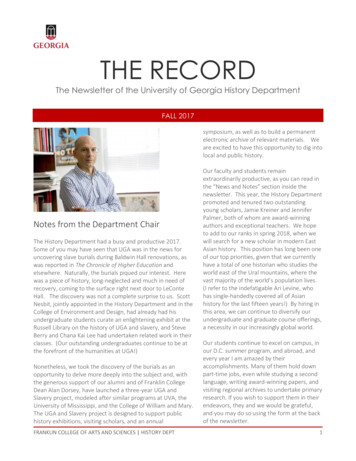
Transcription
THE RECORDThe Newsletter of the University of Georgia History DepartmentFALL 2017symposium, as well as to build a permanentelectronic archive of relevant materials. Weare excited to have this opportunity to dig intolocal and public history.Notes from the Department ChairThe History Department had a busy and productive 2017.Some of you may have seen that UGA was in the news foruncovering slave burials during Baldwin Hall renovations, aswas reported in The Chronicle of Higher Education andelsewhere. Naturally, the burials piqued our interest. Herewas a piece of history, long-neglected and much in need ofrecovery, coming to the surface right next door to LeConteHall. The discovery was not a complete surprise to us. ScottNesbit, jointly appointed in the History Department and in theCollege of Environment and Design, had already had hisundergraduate students curate an enlightening exhibit at theRussell Library on the history of UGA and slavery, and SteveBerry and Chana Kai Lee had undertaken related work in theirclasses. (Our outstanding undergraduates continue to be atthe forefront of the humanities at UGA!)Nonetheless, we took the discovery of the burials as anopportunity to delve more deeply into the subject and, withthe generous support of our alumni and of Franklin CollegeDean Alan Dorsey, have launched a three-year UGA andSlavery project, modeled after similar programs at UVA, theUniversity of Mississippi, and the College of William and Mary.The UGA and Slavery project is designed to support publichistory exhibitions, visiting scholars, and an annualFRANKLIN COLLEGE OF ARTS AND SCIENCES HISTORY DEPTOur faculty and students remainextraordinarily productive, as you can read inthe “News and Notes” section inside thenewsletter. This year, the History Departmentpromoted and tenured two outstandingyoung scholars, Jamie Kreiner and JenniferPalmer, both of whom are award-winningauthors and exceptional teachers. We hopeto add to our ranks in spring 2018, when wewill search for a new scholar in modern EastAsian history. This position has long been oneof our top priorities, given that we currentlyhave a total of one historian who studies theworld east of the Ural mountains, where thevast majority of the world’s population lives.(I refer to the indefatigable Ari Levine, whohas single-handedly covered all of Asianhistory for the last fifteen years!) By hiring inthis area, we can continue to diversify ourundergraduate and graduate course offerings,a necessity in our increasingly global world.Our students continue to excel on campus, inour D.C. summer program, and abroad, andevery year I am amazed by theiraccomplishments. Many of them hold downpart-time jobs, even while studying a secondlanguage, writing award-winning papers, andvisiting regional archives to undertake primaryresearch. If you wish to support them in theirendeavors, they and we would be grateful,and you may do so using the form at the backof the newsletter.1
FALL 2017Finally, I would be remiss in not mentioning the Department’sfirst-ever hype video, inspired by the football team’s ownpregame videos. (Please see “History Goes Hollywood” for adescription of this hilarious production, which is available forviewing on our homepage or on YouTube.) We are delightedto see that the football team is finally catching up with theHistory Department in earning national recognition!Wishing you a happy and healthy 2018 Claudio SauntRichard B. Russell Chair in American History,and Department HeadBASEBALL, APPLE PIE, LINCOLN AND THE SMITHSONIAN: GEORGIA’S PUBLICHISTORY INTERNSHIP PROGRAM.Bryant Barnes interviewed Akela Reason about the Public History Program in Washington, D.C., September2017. (This interview has been edited for length.)Barnes is a doctoral student in history and recipient of UGA’s GREAT Georgia Research Education AwardTraineeship (GREAT) Program. GREAT Fellows are selected from among applicants to UGA doctoral programs,and are chosen from the most outstanding nominees who demonstrate superior potential that complement/support the research and scholarships strengths of the university.Akela Reason is the author of Thomas Eakins and the Uses of History (U. Penn Press, 2010), which won the2011 Southeastern College Art Conference Award for Excellence in Scholarly Research and Publication. Inaddition to teaching, she has worked at the Smithsonian Institution, the Philadelphia Museum of Art, and theHigh Museum of Art. She is currently preparing a study of the politics of Civil War monuments in New York Cityduring the Gilded Age. In summer 2016, she founded the department's first Public History program inWashington D.C.the work that historians do outside of universities inWhat is the Public History Program?museums, archives, libraries, and historic sites. WeThe Public History Program is a summer programspend the first part of the program during Mayin its third year in 2018 where I take students tovisiting museums, parks, monuments, historic sites,Washington to learn about public history, which isand meeting with people and finding out what theyFRANKLIN COLLEGE OF ARTS AND SCIENCES HISTORY DEPT2
FALL 2017do and how they got their jobs. In June and Julystudents intern at a public history site.What kinds of internships have students had in thepast?There are a few institutions that have been workingwith us for the past two years: The Library ofCongress Chronicling America Newspaper Project,the National Archives; we’ve had this year, for thefirst time, a student at the new SmithsonianMuseum of African American History & Culture;we’ve had students at Tudor Place, which is ahistoric house in Georgetown. We had a student atWoodrow Wilson’s Home, which is a National TrustProperty. We have had students at otherSmithsonian entities; the Postal Museum and at theSmithsonian American Art Museum. MarjorieMerriweather Post’s house - the Hillwood Mansion– Isabel Mann did an internship there. I don’t thinkI’ve got all of them, but that’s a good chunk.support for the majority of the students who areattending the program. The Office of ExperientialLearning also has a scholarship program that theyrun in October and February, so students applyingto this program would be eligible for the Februarydeadline. And then our study abroad fellowshipscan also be applied for within the department forsupport from this program.What liberties do students have when they aren’tfulfilling their responsibilities to the program?They get to explore Washington. They often end updoing things together. A lot of times they’ll visit goto a baseball game, visit historic sites. They go toArlington Cemetery; they go to any of the sites thatwe don’t get to visit. They tour the monuments atnight. There are also programs that are not quitepart of my program. Washington Semester Programhas a few alumni events that the students getinvited to, and there are sometimes offers ofprivate tours from different Congressional offices.You mentioned field trips. What kind of field tripshave you done?How much does the program cost?The program costs it’s a six-credit program, so thetuition and fees apply, although there are a handfulof fees that don’t get charged to students off UGA’scampus. And then there is a program fee which isalmost entirely for housing. And then the studentsend up being housed together on Capitol Hill, not inUGA’s dorm, but in housing provided byWashington Intern Student Housing. It’s right inthe heart, it’s two blocks from the Capitol.Is financial aid available to students?There are a number of funding sources. The[History] department has funds to offer someFRANKLIN COLLEGE OF ARTS AND SCIENCES HISTORY DEPTOn one, we go to Washington’s Mount Vernon. Theother, we go to the Gettysburg Battlefield, which isa long trip, so we spend the entire day, dealing withGettysburg. But on a more day-to-day schedule, weusually start with some kind of tour of the U.S.Capitol, and a behind-the-scenes meeting with thecurator of the Capitol. And we’ve visited theMuseum of American History and met with curatorsand registrars there. The registrar is actually reallyentertaining and they have over a million objects,so he has great stories about trying to keep track ofall those things. The National Trust has been reallysupportive because there are a lot of UGA Alums atthe National Trust and their headquarters is in theWatergate Complex and we’ve met with them acouple times, and the view is spectacular. Theyusually give a talk. The Lincoln Cottage, which is nota site on everyone’s radar it’s up in northwestWashington and it’s a place where Lincoln spent a3
FALL 2017quarter of his presidency during the Civil War. It’s acottage that tries to innovatively tell the story ofLincoln’s time there, using media and audio clips,and smells. They actually use smell in some of therooms; they have an apple pie smell and a woodfire smell they use to try to create a response invisitors.learned is that Washington has more UGA alumnithan any other city outside of Georgia and there areover 1500 UGA history majors in D.C. They’re doingall kinds of things.Why does public history matter to you and whyshould students consider this program?I love old stuff, so I like to have opportunities tolook at how things can tell stories about history, sothat’s my own personal interest. But for thestudents, I think they are unaware of how muchthey can do with a history degree. It’s not just ateach or go to law school major; there are many,many things they can do, and still remain in a fieldthat they love. So they can become an archivist andwork with historical documents, or they canbecome a librarian, or museum professional andstill have an experience where they are workingwith history. And in some cases that history is reallypretty exciting. You get to actually touch Lincoln’shat or read letters by Queen Elizabeth I as part ofyour job, and that is pretty cool!As the program is “growing up,” are organizationsreaching out to the Public History Program?Actually the National Trust contacted me. Becausethere are several alums at the National Trust, theyhad a press release when the program started andthey reached out to me. They’ve been supersupportive. They’ve hosted interns, they’veprovided programming for us and talked to thestudents at length. The other place, this year, thatwas a kind of fun UGA connection is there is anoffice full of historians at the US State Department.One of the historians, Elizabeth Charles, is a UGAgrad, so she was interested in getting involved withthe program. She gave a talk to my students. Sheremembered [our faculty] and it was kind ofinteresting to see a person in the State Departmenthaving a UGA pedigree. The other thing that IFRANKLIN COLLEGE OF ARTS AND SCIENCES HISTORY DEPTAre you anticipating a rise in interest in publichistory, given recent events?I think there definitely has been. A lot of peoplehave contacted me out of the blue, students, justasking questions about Confederate monuments orother events in the public history sphere. When wewere there the first year, there were articles in theWashington Post almost daily about theGeorgetown Slavery Project, so I contacted AdamRothman at the Slavery Project and he was able toadd a quick talk to my students as those eventswere unfolding.HISTORY GOES HOLLYWOODDid you see our new video? Inspired by GeorgiaFootball’s Friday hype videos that are releasedbefore each game to inspire and fire up fans, thehistory department video is less a parody than acelebration of the energy and creativity of ourfaculty and students and of the research, teaching,and learning opportunities we have at Georgia. Youcan view the video right on the history main website www.history.uga.edu, on our YouTube channel,or on our Twitter page.This entertaining video was put together quicklyand was the bright idea of assistant professor SteveSoper, who brought on other students and faculty,including professors Jennifer Palmer, John Morrow,and Akela Reason to realize his idea. The video was4
FALL 2017brought to life by a talented sophomore Journalismmajor, Reagan Jones. The legendary Jim Cobb,against his best judgment, volunteered to do thevoiceover. Please check it out!DID YOU KNOW ? THE HISTORYDEPARTMENT IS ON SOCIAL MEDIANot just old school! You can follow @UGAHistoryon Twitter, Facebook, and Instagram. You can alsoview our new hype video on YouTube on the UGAHistory Department page.ON THE RECORD NEWS AND NOTESFROM 2017Our first two students in the combined bachelor’smaster’s honors program are both due to graduatein 2018. Isabel Mann, who also co-founded theFriends of Gospel Pilgrim Cemetery student serviceorganization, plans to graduate with a bachelor’sdegree in history and religion, along with a master’sdegree in history. Mann, who interned both inWashington, D.C., as a participant in our summerpublic history internship program, and in Athenswith the Athens Land Trust, plans to continue topursue public service after graduation. PalomaCarroll will be graduating with a dual B.A. in historyand B.S.E.D. in Social Studies Education and amaster’s degree in history. Carroll also justcompleted her year of student teaching and willalso be graduating with teaching certification.Our student programs in history continue toexpand. The Double Dawgs program was created togive ambitious and motivated students acompetitive advantage in today’s economy byearning both a bachelor’s degree and a master’sdegree in five years or less. We now offer acombined B.A. degree in history along with a M.A.in Middle School Education (A.B. /M.A.T) availableto all eligible UGA undergrads. With continuedsupport from the university, we hope toFRANKLIN COLLEGE OF ARTS AND SCIENCES HISTORY DEPTcontinue to add more applicable degreeopportunities for our students.History faculty John Short, Steve Soper, and KirkWillis were all named Special Collections LibrariesFaculty Fellows for 2018. Triple Dawg (history) andProfessor emeritus James Cobb inducted into theGeorgia Writer's Hall of Fame.James Cobb discussed the issues surrounding theremoval of the confederate flag in Time magazineonline July 6. Cobb's most recent book is The Southand America Since World War II.Stephen Mihm has a regular column on BloombergView (Bloomberg.com) where his articles give ahistorical perspective to current events in business.History alum Keri Leigh Merritt’s opinion letterabout the importance of historians weighing in onthe national news appearing in the New York Times.She is the author of the new book Masterless Men:A New Book on Poor Whites and Slavery (CambridgeUP, 2017).Ph.D. candidate Alex Nordlund has been acceptedto the UGA-Liverpool Doctoral Fellowship for 2018,with Dr. Mark Towsey in the Liverpool Departmentof History serving as a local mentor. Alex'sdissertation focuses on the impact of censorship,trauma, and prewar identity within British letterwriting from the First World WarMaster’s student Zachary Allen was the firstgraduate student to participate in our summerPublic History Internship program in Washington.Allen interned for the American HistoricalAssociation at their D.C. headquarters and workedon website and blog postings and online projects.His opportunity was made possible with the supportof a Gregory graduate student travel award andPublic History Scholarship. Allen was the firstgraduate student to participate in this summerprogram.5
FALL 2017Ph.D. candidate Kate Dahlstrand’s oral historyproject on female veterans was recently featured inthe media. The UGA Special Collections Library, theSVRC, and the SVA partnered to initiate a StudentVeteran Oral History Program. The purpose of thisprogram is to record and preserve the uniqueperspectives of our diverse student veterans asthey transition to civilian life and the university. AUS Army veteran herself, Dahlstrand is currentlyteaching her course, “The American Veteran:Revolutionary War through the Great War.”Interpretation of Power in the Late MedievalEurasian World,” edited by Thomas Ertl.Scott Nelson’s book, Steel Drivin’ Man (2007), aboutthe life and legend of John Henry, was used as thebasis of the play “JH: Mechanics of a Legend,”performed in February at the August Wilson Centerfor African American Culture in Pittsburgh.NEW AND NOTABLE BOOKS BY OURALUMNIRECENT DEPARTMENTAL PUBLICATIONSBerry, Stephen. Practical Strangers: The CourtshipCorrespondence of Nathaniel Dawson and ElodieTodd, Sister of Mary Todd Lincoln. UGA Press, 2017.Hoffer, Peter C. Rutgers v. Waddington: AlexanderHamilton, the End of the War for Independence, andthe Origins of Judicial Review. University Press ofKansas, 2016.Hoffer, Peter C. Co-author, The Federal Courts: AnEssential History. Oxford University Press, 2016.Inscoe, John C. “Feeling Awful Southern . . . OrNot?” in Orville V. Burton and Eldred E. Prince, Jr.eds., Becoming Southern Writers: Essay in Honor ofCharles Joyner. University of South Carolina Press,2016.Kreiner, Jamie. “Pigs In The Flesh And Fisc: An EarlyMedieval Ecology.” Past & Present 236 (2017): 3-42.Levine, Ari D. “Court and Country: Discourses ofSocio-Political Authority in Northern and SouthernSong China.” The Medieval History Journal 19.2(October 2016), pp. 351–393. Special issue“Command versus Consent: Representation andFRANKLIN COLLEGE OF ARTS AND SCIENCES HISTORY DEPTRood, Daniel. The Reinvention of Atlantic Slavery:Technology, Labor, Race, And Capitalism In TheGreater Caribbean. Oxford University Press, 2017.Winship, Michael P. Chapter on the various earlyforms of English church establishments in theAmericas, '' British America to 1662." Oxford Historyof Anglicanism, vol. I. Oxford University Press, 2017.Are you an alumnus of the History Department? Wewould like to feature recent (within the last 12months) books by alumni in a new building displayin LeConte Hall. If you have a new or forthcomingbook release, please keep us in mind—we wouldlove to receive a copy for display and promotion.Breen, Patrick H. The Land Shall be Deluged inBlood: A New History of the Nat Turner Revolt.Oxford University Press, 2016.Grem, Darren E. The Blessings of Business: HowCorporations Shaped Conservative Society. OxfordUniversity Press, 2016.Hulbert, Matthew C. The Ghosts of GuerillaMemory: How Civil War Bushwackers BecameGunslingers in the American West (UnCivil WarsSeries). UGA Press, 2016.Merritt, Keri Leigh. Masterless Men: Poor Whitesand Slavery in the Antebellum South. CambridgeUniversity Press, 2017.Oki, William Thomas. The Georgia Peach: Culture,Agriculture, and Environment in the AmericanSouth. Cambridge University Press, 2016.Olsson, Tore. Agrarian Crossings: Reformers and theRemaking of the US and Mexican Countryside.Princeton University Press, 2017.6
FALL 2017Commit to History at the University ofGeorgiaUGA Students in Washington, D.C.Kaitlin Dotson interned at the Library of Congress AmericanFolklife Center, and had the unique opportunity just theother day of meeting Carla Hayden, the 14th Librarian ofCongress and first African American Librarian of Congress.“It was very exciting,” Kaitlin said, “and I was quite nervous.She is very nice, and we spoke briefly. It was a greatexperience; I remember watching the live stream of herswearing in on my phone last fall right before yourMuseums class began”.Students who attend the History Department’s Washington Program must pay for room andboard in addition to standard tuition. To help support one of our majors in Washington, pleaseconsider donating to the Student Support Fund, which funds need and merit-based scholarships.Yes, I would like to support study in Washington, D.C. with a gift of: 1,000 500 100Other Make checks payable to: THE UGA FOUNDATION – History Student Support FundMail to: UGA Foundation, Gift Accounting, 394 S. Milledge Avenue, Athens, GA 30602NameAddressCity/State/ZipPhone/EmailGIVE ONLINE. It’s quick and easy. Go to: www.gail.uga.edu/historyssfFor questions about giving, please contact: Franklin College Office of Development,706-542-4658about giving? Please874281868FRANKLIN COLLEGE OF ARTS AND SCIENCES HISTORY DEPT7
LeConte HallUniversity of GeorgiaAthens, GA 30602-1602Return Service RequestedNON-PROFITORGANIZATIONUS POSTAGEPAIDATHENS, GAPERMIT #515
Slavery project, modeled after similar programs at UVA, research. the University of Mississippi, and the College of William and Mary. e . Barnes is a doctoral student in history and recipient of UGA's GREAT Georgia Research Education Award Traineeship (GREAT) Program. GREAT Fellows are selected from among applicants to UGA doctoral programs,


